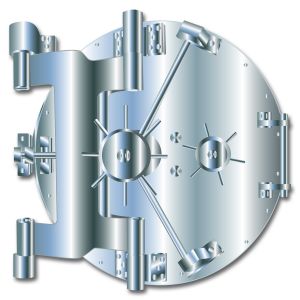How to Stop the Cycle of Overdraft Fees, Part Two
Yesterday I introduced a 10-step process that will help you stop overdrawing your bank account. (Actually it’s more like 100 steps, but I tried to break it down into manageable pieces.) If you missed that post, go back and check it out now so you’ll know what we’re talking about.
Where We Are
I’ve given you the tools you need to get out of overdraft hell, but you’re probably thinking it’s too complicated and will never work. It requires too much effort, you can’t use your checks and debit cards, and you have to give your money to someone else like you’re a four year-old. What fun is that?
No fun at all. But neither is handing a bank hundreds of dollars every month.
If you want to stop paying overdraft fees, you have to make some sacrifices for a little while. I’m not saying you have to like it, because I sure didn’t. But it’s nice to have all your money available to you when you get paid instead of losing half of it. It’s awesome to log on to your online banking without seeing a big fat negative balance. And no matter how many years you’ve spent playing the catch-up game, you can stop this once and for all.
The Day I Woke Up
One day in 2009, I got a phone call at work. Did I realize my check to the gas station had bounced? Um, no….
My bank, which had typically given me a chance to make a deposit before returning a check unpaid, decided they were done with my crap. So my check was returned to the gas station’s main office, where it was forwarded to the county attorney. I had 10 days to pay it.
That $20 check cost me over $100 after the overdraft fees, $40 returned check fee, and the county attorney’s fee. At the time, I was trying to gather the courage to file for divorce. I remember thinking, I’m never going to make it on my own if I can’t even keep track of where my money is going.
No More Overdraft Fees - How I Did It
I printed out some bank statements and started going through them. I wanted to know WHY my ex and I were making nearly $70k a year and couldn’t keep our shit together. I wanted to know where the money went. I wanted to understand why we were struggling. I was over it.
As I went through my bank statements, I was horrified by what I found. We were spending over $800 A MONTH on groceries and dining out. I would have guessed maybe $400. I won’t even talk about what we were both spending on random shopping - it was “only $20″ or “only $12.99,” but those little purchases were adding up in a BIG way. We were also spending significantly more than we brought in each month. I put my head on my desk (yes, I was still at work when all this was going on) and cried.
After work that day, my ex and I went straight to my parents’ house. I told my dad I was sick and tired of being broke all the time and wanted some help to stop overdrawing our account. After several hours of going through the bank statements, arguing, and resisting, we agreed to hand over control of our money until we could manage it like adults.
The Plan
I had to sit down and figure out every outstanding check, debit purchase, and online bill payment due to leave our checking account. It was clear there was more scheduled out than money in the bank. My dad (kind, patient soul that he is) wrote me a check to cover the difference. I handed over my checkbook and debit card.
We then had to figure out how much it actually took to pay our bills. At the time, our mortgage, car payments, car insurance, utilities, phone bill, and credit card payments added up to about $2600 a month. We brought home nearly $4000 a month, so there was NO reason we couldn’t make it. We were just spending whatever we wanted without keeping track.
On payday, I wrote my dad a check for $700, leaving $1300 in the bank to cover the bills. We got a weekly allowance of $300 cash - $100 for groceries, $50 each for gas, and $50 each for random spending. The extra $100 would be held back to make a buffer against future overdrafts.
I realize that’s a lot of money compared to what many people have left over after bills, but for us, it was torture. We were used to spending hundreds of dollars a week on junk we didn’t need.
Epic Failure
The first week, I thought I would have a nervous breakdown in the grocery store. It was absolutely IMPOSSIBLE to spend less than $100 if we were going to have food in the house. I had never looked at what things cost; I just bought them! I was literally walking up and down the aisles with a calculator, talking to myself. I think I cried a few times. That trip to the store took over 2 hours.
My ex-husband ran out of money by Wednesday. He’d used all his free money PLUS some of his gas money to buy fast food, and now his tank was nearly empty. Grinning, he called my dad to dip into the $100 we had left over. Except my dad told him no. “Better find a way to get some extra money,” my dad told him. My ex was no longer laughing as he packed up one of his prized handguns and drove to the local pawn shop to sell it.
It’s probably a good thing we had one less gun in the house. Otherwise we might have killed each other.
We Finally Adjust - Sort Of
Overall, we spent two months - 4 paydays - following this plan to stop the overdraft fees. At the end, our bank account had about $90 left over, and my dad was holding $400 that he’d siphoned from our payments to him. We took the $400 to the bank and opened a savings account, which was linked to our checking account in case we ever overspent again.
I took this very seriously. After two months of struggling to live within our means, I didn’t want to go through anything like this ever again. But my ex? Not so much. He immediately returned to spending like we had an unlimited supply of money.
Before long, our $400 buffer was gone and we were no longer adding to it. Frustrated, I decided I was tired of trying. I wouldn’t use the money in our bank account, but I started using my credit cards here and there. I rationalized it by thinking, We’re already making the credit card payments, so a little more won’t hurt. Within weeks of “graduating” from a crash course in responsible spending, we were overdrawn again.
Where We Went Wrong
I didn’t regain control of myself and my money until after my divorce. When two spendaholics live in the same house, it’s impossible to make changes if both of you aren’t on board with them. No matter what I did, my ex was behind me undoing it. Then I would get angry and console myself with some emotional spending.
Our biggest mistake was failing to implement a budget. While we were living on a cash allowance, we should have made a budget to use after my dad stepped out of our financial lives. The system we had was working just fine. But instead, we returned to the same old habits as before.
It wasn’t feasible for my dad to give us an allowance forever. And we would have succeeded in escaping overdraft fees if we had just continued what we were doing.
Don’t be dumb like we were. Once you stop overdrawing your bank account, take steps to keep it that way!
Victory is MINE!
When I got divorced, I implemented the steps to stop overdraft fees yet again. I wrote my dad a check each payday. He gave me a cash allowance. I saved a little bit of money. And I realized I LIKED having some predictability in my finances. Now that I had no one else using my bank account, I could take control.
So I made a budget. I switched to a bank that helped me keep better track of my money. And last week, I celebrated the milestone of 10 months without paying a bank fee AND 10 months without borrowing money from my parents.
You CAN stop the cycle of overdraft fees. But understand that you are undertaking a lifestyle change, not something you can do for awhile and then stop. Change the way you think about spending, and keep your money where it belongs - in your pocket - instead of giving it to the bank.










Thanks for sharing your story - I like the way you posted your learning experience in parts. These types of posts are so much better than the "five ways to stop overdrafts" in my opinion.
This was a really great article. I am actually passing it on to a few people I know who are in the same type of cycle.
Judy
My mom has this great saying (that she often uses to talk about my not so dearly departed dad). She says "It's a lot easier to have 2 mules pulling a cart forward than to have one mule pulling forward and the other in reverse."
Money IQ has always been a very important part of picking a life partner. My first serious boyfriend in high school was a spendaholic and it was so stressful. I couldn't imagine my whole life like that.
I remember having an overdraft when I was younger and having some similar things happen to me. i went so far as to really screw up my banking history which led me to having to open a second chance checking account and getting turned over to check systems. I'm so happy I've come so far, but I would never EVER wish it on anyone.
Well said, girl (and go dad!). I remember printing up my checking transactions a few years ago, also at work, and adding up everything we'd spent on extras for the month. I was astounded at the number I saw. It took a few years of making those lifestyle adjustments, painful as it was, but once you can get past it, it's so much easier.
Thanks for sharing your story.
I absolutely agree. People shouldn't give their hear-earned money to the bank. They should give it to me instead! Just send me a paypal payment at…oh, wait, maybe soliciting here isn't a nice thing to do.
Unfortunately, it is difficult for people to make drastic lifestyle changes, but it's good that you had support in doing so. I think having a good support system is what keeps many people from making smarter decisions like taking control of their money. Maybe you can write a guide on how to do it
I am always so impressed with how relatable and helpful your posts are. Thank you for sharing your story.
I am so glad you are on track! Thanks for the story!
I started padding our checking account with $1000 so that even if our mortgage is drafted twice, we'd be covered.